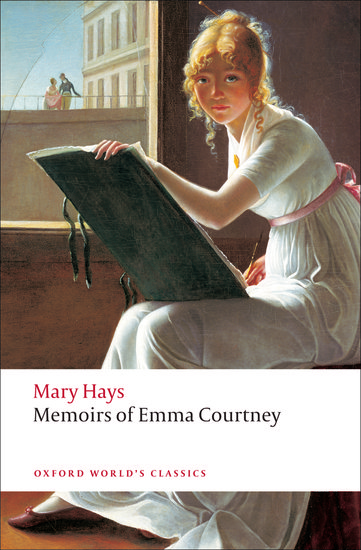
By Eleanor Ty
Pain of Unrequited Love is a blog dedicated to “probably the worst feeling in the world.” It contains short posts in the form of text and image, poetry, prose, drawings, cartoons, photos, animated GIFS, and links to pop song videos, all describing feelings of rejection, hurt, and loneliness. Posts relate stories of falling in love, intense passion, and then loss. To date, the blog boasts of visitors from 156 countries.
One might think that this desire for self-exhibition is the product of the selfie, Facebook, and Instagram age of today. The “I” generation, which grew up with pods, pads, and cellphones, seems to have little or no sense of privacy, and happily proclaim and update their “relationship status” to all their five hundred and ten friends (the average number of friends on Facebook for 18-24 year-olds). But in the late eighteenth-century, novelist, essayist and Dissenter, Mary Hays, born on 13th October 1760, also broke the boundaries between the personal the public by gathering the love letters she had written to a man she adored but who apparently did not reciprocate her feelings, and publishing them as an epistolary novel. In doing so, she caught the attention and aroused the ire of minor British poet Charles Lloyd (friend of Samuel Coleridge), novelist Elizabeth Hamilton (Scottish novelist and educator), and Robert Southey.
In the early 1790s, Mary Hays was a rising writer who had published an Oriental tale, an essay on the usefulness of public worship, and, with her sister, produced a collection of essays on miscellaneous topics: romances, friendships, and improvements to female education. She admired and had befriended radicals Mary Wollstonecraft and William Godwin, and was introduced to the circle of London intellectuals in the 1790s. William Frend, a social reformer, writer, and Unitarian minister, had corresponded with her because he had read her works, but he did not return her passionate feelings for him. Believing that what she felt for him was based on reason and affection, Hays pursued Frend with letters, repeatedly presenting justifications for her love:
“An attachment sanctioned by nature, reason, and virtue, ennobles the mind capable of conceiving and cherishing it: of such an attachment a corrupt heart is utterly incapable” (Emma Courtney, 81-82).
She cannot understand how he cannot return her feelings, offering good examples of their compatibility:
“Our principles are in unison, our tastes and habits not dissimilar, our knowledge of, and confidence in, each other’s virtues is reciprocal, tried and established – our ages, personal accomplishments, and mental acquirements do not materially differ…. How, then, can I believe it compatible with the nature of mind, that so many strong efforts, and reiterated impressions, can have produced no effect upon yours: Is your heart constituted differently from every other human heart?” (Emma Courtney 121-122).

However, her directness was perceived as an act of impropriety by her contemporaries who satirized the candour of Emma, and by association, Hays herself. In her novel, Memoirs of Modern Philosophers (1800), Elizabeth Hamilton created a character, humorously called “Bridgetina Botherim,” who is associated with the dangerous “new” philosophy imported from revolutionary France. As Claire Grogan notes, this new philosophy encourages “selfish, romantically self-indulgent, and obsessive behaviour” (Eighteenth-Century Fiction 2006). Emma’s attempts at rationalizing her affections were caricatured and ridiculed by Hamilton. Bridgetina Botherim thinks, “Why should he not love me? What reason can he give? Do you think I have not investigated the subject?” (Modern Philosophers 179). Hays’s ideas about the power of feelings, about the noble link between reason and affection were too advanced for her contemporaries. Memoirs of Emma Courtney remains a fascinating blend of feminist philosophy, melodrama, depicting a very un-Austen-like heroine who challenges reader’s expectations of how a proper lady should behave and what she should say.
Eleanor Ty is a Professor in the Department of English and Film Studies at Wilfrid Laurier University. She works in two areas: on Asian North American Literature and Film and on Eighteenth Century British Literature. For Oxford World’s Classics, she has edited Memoirs of Emma Courtney by Mary Hays.
For over 100 years Oxford World’s Classics has made available the broadest spectrum of literature from around the globe. Each affordable volume reflects Oxford’s commitment to scholarship, providing the most accurate text plus a wealth of other valuable features, including expert introductions by leading authorities, voluminous notes to clarify the text, up-to-date bibliographies for further study, and much more. You can follow Oxford World’s Classics on Twitter, Facebook, or here on the OUPblog.
Subscribe to the OUPblog via email or RSS.
Subscribe to only literature articles on the OUPblog via email or RSS.
Subscribe to only Oxford World’s Classics articles on the OUPblog via email or RSS.
Image Credit: Title page from Mary Hays’s Memoirs of Emma Courtney, 1796 [public domain]. Via Wikimedia Commons.



Recent Comments
There are currently no comments.